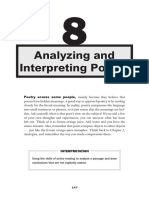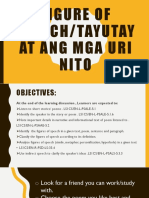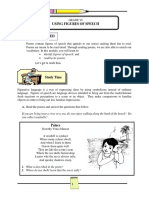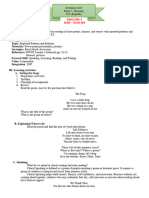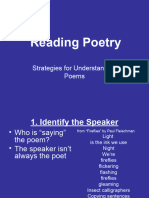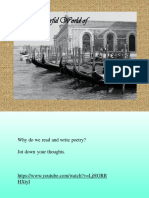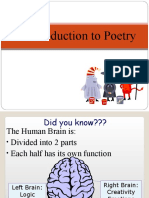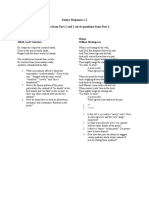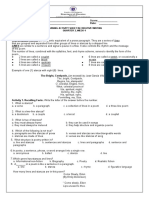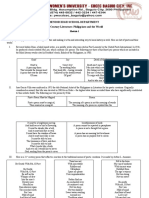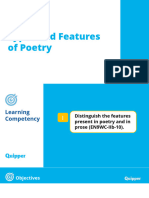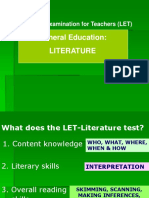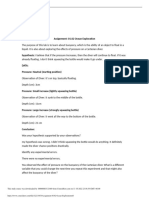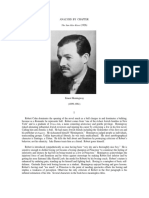Middle Level Reading Part 3 Poem
Middle Level Reading Part 3 Poem
Uploaded by
이세희Copyright:
Available Formats
Middle Level Reading Part 3 Poem
Middle Level Reading Part 3 Poem
Uploaded by
이세희Original Title
Copyright
Available Formats
Share this document
Did you find this document useful?
Is this content inappropriate?
Copyright:
Available Formats
Middle Level Reading Part 3 Poem
Middle Level Reading Part 3 Poem
Uploaded by
이세희Copyright:
Available Formats
Analyzing and
8
Interpreting Poems
Poetry scares some people, mainly because they believe that
poems have hidden meanings. A good way to approach poetry is by reading
closely for the literal meaning. In reality, poetry compresses the language
into small sentences or phrases, so it just seems that the meanings are hid-
den. Ask yourself, what is that poet’s view on the subject? If you add a few
of your own thoughts and experiences, you can uncover what has been
left out. Think of it as frozen orange juice. Add water and you have the
entire amount. Also, remember that poets compare objects to other objects
. . . just like the frozen orange-juice metaphor. Think back to Chapter 2,
Analogies, and remember the way you made comparisons there.
INTERPRETATION
Using the skills of active reading to analyze a passage and draw
conclusions that are not explicitly stated.
114477
6801_501_ReadingCompQuest_4E[fin].indd 147 3/18/10 1:34:56 PM
501 Reading Comprehension Questions
As you begin to read the poems in this section, it is important to under-
stand who is speaking in the poem. (The speaker may not be the poet.)
Once you can identify the narrator, you should be able to get an idea of
the narrator’s attitude toward the subject, and this is easily discovered by
the author’s word choice. Through the images that the words make, you
should be able to answer the questions correctly.
POETRY
Most Traditional poetry follows a rhythmic pattern and rhyme
scheme. Note how these two lines rhyme and share the same
rhyme and share the same rhythm or meter:
He who fights and runs away
Lives to fight another day.
148
6801_501_ReadingCompQuest_4E[fin].indd 148 3/18/10 1:34:56 PM
501 Reading Comprehension Questions
The answers to this section begin page 157.
The following poem is by Alfred, Lord Tennyson. Consider the title of this
poem as a guide to meaning.
The Eagle
He clasps the crag with crooked hands;
Close to the sun in lonely lands,
Ringed with the azure world he stands.
The wrinkled sea beneath him crawls;
He watches from his mountain walls,
And like a thunderbolt he falls.
329. Given the tone of the poem, and noting especially the last line,
what is the eagle most likely doing in the poem?
a. dying of old age
b. hunting prey
c. learning joyfully to fly
d. keeping watch over a nest of young eagles
330. To which of the following do the underlined words azure world
most likely refer?
a. a forest
b. the sky
c. the cliff
d. nature
331. In the second stanza, first line, to which of the following does the
verb crawls refer?
a. waves
b. sunlight on the water
c. the eagle’s prey
d. the eagle itself
149
6801_501_ReadingCompQuest_4E[fin].indd 149 3/18/10 1:34:56 PM
501 Reading Comprehension Questions
This poem, by Emily Dickinson, is a sort of riddle. Depending on your life
experiences, the answer may be immediately clear, or it may very well not
be. Look closely for clues in the language.
A Narrow Fellow in the Grass
A narrow Fellow in the grass
Occasionally rides—
You may have met him—did you not
His notice sudden is—
The Grass divides as with a Comb—
A spotted shaft is seen—
And then it closes at your feet
And opens further on—
He likes a Boggy Acre—
A Floor too cool for Corn—
Yet when a Boy, and Barefoot—
I more than once at Noon
Have passed, I thought, a Whip-lash
Unbraiding in the Sun—
When, stooping to secure it,
It wrinkled, and was gone—
Several of Nature’s People
I know, and they know me—
I feel for them a transport
Of cordiality—
But never met this Fellow,
Attended, or alone—
Without a tighter breathing
And zero at the bone—
332. Who or what is the Fellow in this poem?
a. a whip-lash
b. a snake
c. a gust of wind
d. a boy
150
6801_501_ReadingCompQuest_4E[fin].indd 150 3/18/10 1:34:56 PM
501 Reading Comprehension Questions
333. The phrase Without a tighter breathing / And zero at the bone most
nearly indicates
a. fright.
b. cold.
c. grief.
d. awe.
334. The phrase Nature’s People means
a. nature-lovers.
b. children.
c. animals.
d. neighbors.
335. The speaker of this poem is most likely
a. an adult woman.
b. an adult man.
c. Emily Dickinson, the poet.
d. a young boy.
11 55 11
6801_501_ReadingCompQuest_4E[fin].indd 151 3/18/10 1:34:56 PM
501 Reading Comprehension Questions
It’s true that poems often have two levels—one literal, one figurative.
The next poem, also by Emily Dickinson, is full of images from nature.
In exploring the second level of meaning, consider the speaker’s attitude,
revealed especially through surprising and jarring word choices.
Apparently with No Surprise
Apparently with no surprise
To any happy flower,
The frost beheads it at its play
In accidental power.
The blond assassin passes on,
The sun proceeds unmoved
To measure off another day
For an approving God.
336. Which of the following most nearly describes the author’s attitude
toward nature as expressed in this poem?
a. delight
b. dismay
c. indifference
d. reverence
337. The poem implies that the attitude of the flowers toward the frost
is one of
a. fear.
b. horror.
c. acceptance.
d. reverence.
338. The tone of the poem implies that the speaker probably regards
God as
a. benevolent.
b. just.
c. cruel.
d. angry.
152
6801_501_ReadingCompQuest_4E[fin].indd 152 3/18/10 1:34:56 PM
501 Reading Comprehension Questions
Poetry often uses words in unexpected ways. This forces the reader to con-
sider the deeper meanings of words, while also reflecting on the idea that
the poet hopes to get across. Consider both the words and the ideas in this
poem by Sir Walter Scott.
Patriotism
Breathes there the man with soul so dead,
Who never to himself hath said,
“This is my own, my native land!”
Whose heart hath ne’er within him burned
As home his footsteps he hath turned
From wandering on a foreign strand?
If such there breathe, go, mark him well;
For him no Minstrel raptures swell;
High though his titles, proud his name,
Boundless his wealth as wish can claim;
Despite those titles, power, and pelf,
The wretch, concentred all in self,
Living, shall forfeit fair renown,
And, doubly dying, shall go down
To the vile dust from whence he sprung,
Unwept, unhonored, and unsung.
339. What is the most likely meaning of the underlined word pelf, as
used in this poem?
a. power
b. wealth
c. stealth
d. health
340. What is the poet’s main idea in this poem?
a. Those who become rich must hate their country.
b. Traveling abroad helps a person appreciate home.
c. Those who do not love their country will not be honored.
d. Patriotism is the last refuge for scoundrels.
153
6801_501_ReadingCompQuest_4E[fin].indd 153 3/18/10 1:34:56 PM
501 Reading Comprehension Questions
341. What does the poem mean that such people will be “doubly dying”
(three lines from the end)?
a. They will not die alone.
b. They will die physically and also be forgotten.
c. Their death will be painful.
d. They will die, then rise again.
342. What does the underlined word concentred most likely mean?
a. swirling or curved
b. arrogant, proud
c. focused on, concerned with
d. looking upward
343. One can infer from this poem that Sir Walter Scott
a. loved his homeland.
b. was from Great Britain.
c. hated war.
d. spoke many languages.
154
6801_501_ReadingCompQuest_4E[fin].indd 154 3/18/10 1:34:56 PM
501 Reading Comprehension Questions
This next poem is by William Shakespeare.
The Seven Ages of Man
All the world’s a stage,
And all the men and women merely players;
They have their exits and their entrances;
And one man in his time plays many parts.
His acts being seven ages. At first the infant,
Mewling . . . in the nurse’s arms.
And then the whining schoolboy, with his satchel
And shining morning face . . . And then the lover,
Sighing like a furnace . . . Then a soldier
Full of strange oaths . . . Jealous of honor,
Sudden and quick in quarrel . . . And then the
justice . . .
Full of wise saws and modern instances;
And so he plays his part. The sixth age shifts
Into the lean and slippered pantaloon.
With spectacles on nose and pouch on side.
. . . and his big manly voice, Turning again toward
Childish treble, pipes and whistles in his sound.
Last scene of all,
That ends this strange eventful history,
Is second childishness, and mere oblivion,
Sans teeth, sans eyes, sans taste, sans everything.
344. What attitude does the speaker reveal by using the word merely in
the second line?
a. sorrow
b. anger
c. amusement
d. indifference
345. What characterizes the period of life represented by the soldier?
a. brash behavior
b. his sense of honor
c. his dedication to duty
d. his fear of cowardice
155
6801_501_ReadingCompQuest_4E[fin].indd 155 3/18/10 1:34:56 PM
501 Reading Comprehension Questions
346. What is the main idea of this poem?
a. Life is a misery that never gets any better at any time.
b. Life is what each of us makes of it during our journey down the
river of eternity.
c. Life is a play and it follows a specific script, none of which
should cause anguish or sorrow.
d. Life is a comedy, and we are all buffoons in pantaloons no mat-
ter what we do.
347. What is the theme of the poem?
a. Death is to be feared.
b. Life is a circle that brings us back to the beginning.
c. The male of the species is the only true measure of the stages of
life.
d. The stages of life are unrelated and can be altered by each indi-
vidual’s free will.
348. The poet uses the words merely (line 2) and mere (line 20)
a. to soften the effect of the strong images he presents to us in
those lines.
b. to tie together his theme of the cycle of life.
c. convey his tone to the reader.
d. all of the above.
156
6801_501_ReadingCompQuest_4E[fin].indd 156 3/18/10 1:34:56 PM
You might also like
- LS English 8 Workbook AnswersDocument20 pagesLS English 8 Workbook AnswersSherly Octaviany Tjhin88% (69)
- I Wandered Lonely As A Cloud Lesson PlanDocument3 pagesI Wandered Lonely As A Cloud Lesson PlanMinard A. Saladino80% (5)
- Bhrigu - Sarala - Padatthi - From Rule 1 Thru Rule 30 - Part 1Document13 pagesBhrigu - Sarala - Padatthi - From Rule 1 Thru Rule 30 - Part 1Sastry Karra96% (70)
- ELA 3R Unit 4 Lesson 15 - What Are Poems Made ofDocument17 pagesELA 3R Unit 4 Lesson 15 - What Are Poems Made ofKevin Estevez100% (1)
- Lord of The Flies Chapter Comprehension QuestionsDocument4 pagesLord of The Flies Chapter Comprehension Questions이세희No ratings yet
- Analyzing and Interpreting Poems: Poetry Scares Some People, Mainly Because They Believe ThatDocument10 pagesAnalyzing and Interpreting Poems: Poetry Scares Some People, Mainly Because They Believe ThatSpoorthy KrishnaNo ratings yet
- Inference in PoetryDocument4 pagesInference in PoetrySeyedehfatemeh HOSSEİNİNo ratings yet
- 2.1 Poetry Analysis Samples PDFDocument5 pages2.1 Poetry Analysis Samples PDFRomy Sales GrandeNo ratings yet
- PREPARE 6 Literature 5Document2 pagesPREPARE 6 Literature 5Наталья КраснощёкNo ratings yet
- LLT Demo Lesson PlanDocument5 pagesLLT Demo Lesson PlanRhemmia ReigmzNo ratings yet
- PoetryDocument13 pagesPoetry예지No ratings yet
- Figure of Speech (Autosaved)Document19 pagesFigure of Speech (Autosaved)CHILLY ANN D. ALSONGNo ratings yet
- Detailed Lesson Plan by Ivy Claire TelebDocument5 pagesDetailed Lesson Plan by Ivy Claire TelebIvy TelebNo ratings yet
- 9 Pasay ENG 21st CL Q2 W3 D1 JSANTOSDocument5 pages9 Pasay ENG 21st CL Q2 W3 D1 JSANTOSQuilicot, Vernie M.No ratings yet
- Private Lesson - PoemDocument9 pagesPrivate Lesson - PoemMaria Guan LoretoNo ratings yet
- Intro To Poetry 1Document51 pagesIntro To Poetry 1Aneel100% (1)
- Introduction To Poetry: Presented By: Hussam MohammedDocument52 pagesIntroduction To Poetry: Presented By: Hussam MohammeddaekmmmmNo ratings yet
- 01-Humms 11-Pasay-21st-Cl-Q2-W3Document23 pages01-Humms 11-Pasay-21st-Cl-Q2-W3Gina ContilloNo ratings yet
- 26 - Using Figures of Seech Grade6Document11 pages26 - Using Figures of Seech Grade6Gie Escoto Ocampo100% (1)
- Q3 DLP W7 Day 4 English 2Document4 pagesQ3 DLP W7 Day 4 English 2RachelNo ratings yet
- Intro To Poetry 1Document51 pagesIntro To Poetry 1Lilia RaniNo ratings yet
- Semi-Detailed Lesson Plan in English 5 Q1 W8 S.Y. 2023-2024 October 16, 2023 October 17, 2023 October 18, 2023 October 19, 2023 October 20, 2023Document4 pagesSemi-Detailed Lesson Plan in English 5 Q1 W8 S.Y. 2023-2024 October 16, 2023 October 17, 2023 October 18, 2023 October 19, 2023 October 20, 2023Edith Jane ColincoNo ratings yet
- Song Lyric and PoemDocument4 pagesSong Lyric and PoemraihanoasejavandaNo ratings yet
- Reading Poetry 1Document38 pagesReading Poetry 1Myriel Jean LuigNo ratings yet
- 1 Sound DevicesDocument17 pages1 Sound DevicesSoo HaeKyungNo ratings yet
- Senior Phase English Home Language Poetry Study Pack Ver 3Document15 pagesSenior Phase English Home Language Poetry Study Pack Ver 3ABULELA NAMANo ratings yet
- Department of Education (Deped)Document6 pagesDepartment of Education (Deped)MARIAN TIMTIMANNo ratings yet
- Powerpoint PresentationDocument25 pagesPowerpoint Presentationapi-359052294No ratings yet
- Der PantherDocument28 pagesDer Pantherandreilala08No ratings yet
- Poetry BookletDocument15 pagesPoetry Bookletsamarth.sharma6411No ratings yet
- Lyrics Analysis Assignment: The Music of WordsDocument13 pagesLyrics Analysis Assignment: The Music of WordsShalini RamNo ratings yet
- Detailed Lesson Plan (Pangato Aiza C.)Document3 pagesDetailed Lesson Plan (Pangato Aiza C.)aaa100% (2)
- files361617960642LS - English - 8 - Workbook - Answers - PDFX Amz Algorithm AWS4 HMAC SHA256&X Amz CRDocument20 pagesfiles361617960642LS - English - 8 - Workbook - Answers - PDFX Amz Algorithm AWS4 HMAC SHA256&X Amz CRKarimabdoulibn23No ratings yet
- Stylistic Analysis of Good HoursDocument18 pagesStylistic Analysis of Good HoursHira HiraNo ratings yet
- Week 4, English 8 LoveDocument12 pagesWeek 4, English 8 LoveKobe BryNo ratings yet
- Introduction To PoetryDocument40 pagesIntroduction To Poetryalia elsebaieNo ratings yet
- A Narrow Fellow in The GrassDocument5 pagesA Narrow Fellow in The GrassFitri DelitaNo ratings yet
- The Fireside Poets TP-CASTT AnalysisDocument5 pagesThe Fireside Poets TP-CASTT AnalysisSydney ParrishNo ratings yet
- Unseen Poetry e Book Sample PrintableDocument6 pagesUnseen Poetry e Book Sample PrintableSanjay Shinde100% (1)
- Q1 Week2Document3 pagesQ1 Week2RIe RieeeNo ratings yet
- Poetry Response 1-2 Complete 1 Set of Questions From Part 1 and 1 Set of Questions From Part 2Document4 pagesPoetry Response 1-2 Complete 1 Set of Questions From Part 1 and 1 Set of Questions From Part 2Darian WinebergNo ratings yet
- Learning Activity Sheet in Creative Writing Quarter 3, Week 4Document3 pagesLearning Activity Sheet in Creative Writing Quarter 3, Week 4Dona Valdez AgustinNo ratings yet
- Senior High School Department 21 Century Literature: Philippines and The WorldDocument15 pagesSenior High School Department 21 Century Literature: Philippines and The WorldJohn Roland Dugang100% (1)
- English - Grade 9 - Unit 3 - Lesson 1 - Types and Features of PoetryDocument25 pagesEnglish - Grade 9 - Unit 3 - Lesson 1 - Types and Features of PoetryNicole john ZuluetaNo ratings yet
- From A Railway CarriageDocument3 pagesFrom A Railway Carriagesubufb1No ratings yet
- I. Objectives: World Literature. Pp. 317-319Document9 pagesI. Objectives: World Literature. Pp. 317-319Belyn RomeroNo ratings yet
- Unit f661 William Butler Yeats Lesson Plan SampleDocument7 pagesUnit f661 William Butler Yeats Lesson Plan Sampler chawlaNo ratings yet
- Figurative Language #1 - In-ClassDocument3 pagesFigurative Language #1 - In-ClassSusanna LoreficeNo ratings yet
- From A Railway CourageDocument4 pagesFrom A Railway CourageSenthil MadhuNo ratings yet
- Growth Rings by Deng HainanDocument2 pagesGrowth Rings by Deng HainanMarion Giana AdezaNo ratings yet
- Lesson Plan The Cask of AmontilladoDocument4 pagesLesson Plan The Cask of AmontilladoArche Udtohan GaudelNo ratings yet
- Detailed Lesson Plan - Tayag, Jobelle D. (Beed 2c0Document16 pagesDetailed Lesson Plan - Tayag, Jobelle D. (Beed 2c0Jobelle De Vera Tayag100% (1)
- NCERT Solution of First Flight PoemsDocument6 pagesNCERT Solution of First Flight PoemsSubeenaNo ratings yet
- EnglishDocument23 pagesEnglishEthan Chiu RestauroNo ratings yet
- G6 Unit 6 English WB NotesDocument2 pagesG6 Unit 6 English WB NotesIshaan BhoirNo ratings yet
- LiteratureDocument76 pagesLiteratureMhel FelicesNo ratings yet
- Poem: Dust of Snow: Extract Based Comprehension QuestionsDocument19 pagesPoem: Dust of Snow: Extract Based Comprehension Questionsjaigopika chakravarthiNo ratings yet
- Thorns, Horns, and Crescent Moons: Reading and Writing Nature PoemsFrom EverandThorns, Horns, and Crescent Moons: Reading and Writing Nature PoemsNo ratings yet
- ELA 9 TestDocument47 pagesELA 9 Test이세희No ratings yet
- Assignment 01.02 Ocean ExplorationDocument2 pagesAssignment 01.02 Ocean Exploration이세희No ratings yet
- Analysis by Chapter The Sun Also Rises 1926Document20 pagesAnalysis by Chapter The Sun Also Rises 1926이세희No ratings yet
- Algebra Word ProblemsDocument6 pagesAlgebra Word Problems이세희No ratings yet
- Model No.: SC + R9: RF 2.4G RGB/RGBW LED SPI Controller SetDocument4 pagesModel No.: SC + R9: RF 2.4G RGB/RGBW LED SPI Controller SetkujaautumnNo ratings yet
- EE Lab 9Document6 pagesEE Lab 9Abdullah TahirNo ratings yet
- Kirim Final Revisi 520 GISDocument102 pagesKirim Final Revisi 520 GISRizky Dwi HarfianNo ratings yet
- Beban Terdistribusi PDFDocument18 pagesBeban Terdistribusi PDFDeni Juhana SuhermanNo ratings yet
- AirSep Centrox PSA Concentrator - Technical ManualDocument106 pagesAirSep Centrox PSA Concentrator - Technical Manuallegasu100% (1)
- ZXWR RNC O&mDocument56 pagesZXWR RNC O&mhonhungocNo ratings yet
- GL Mathematics Paper 1 AnswersDocument5 pagesGL Mathematics Paper 1 AnswersBharath ReddyNo ratings yet
- Therapeutic Strategies To Combat Antibiotic ResistanceDocument14 pagesTherapeutic Strategies To Combat Antibiotic ResistanceMolly0630No ratings yet
- Precision ToolsDocument32 pagesPrecision Toolshmirfan81No ratings yet
- The Beginning of Everything: Test Paper Nr. 1Document2 pagesThe Beginning of Everything: Test Paper Nr. 1Cebanu CristinaNo ratings yet
- Tuto 1 Week 5 BioDocument4 pagesTuto 1 Week 5 BioAmran NazriNo ratings yet
- Considerations in The Optimisation of Bench Face Angle and Berm Width Geometries For Open Pit MinesDocument22 pagesConsiderations in The Optimisation of Bench Face Angle and Berm Width Geometries For Open Pit MinesPaula OliveiraNo ratings yet
- Burton Connor History PDFDocument68 pagesBurton Connor History PDFKatie ChenNo ratings yet
- NW Model Question With AnsDocument8 pagesNW Model Question With Ansyisakabera123No ratings yet
- Mathematical Association of America, Taylor & Francis, Ltd. Mathematics MagazineDocument6 pagesMathematical Association of America, Taylor & Francis, Ltd. Mathematics Magazineenota15No ratings yet
- Msds CPD SikaLatex UsDocument8 pagesMsds CPD SikaLatex UsmastercssiNo ratings yet
- Dielectric Umbrella DsDocument2 pagesDielectric Umbrella DsBenjamin HidalgoNo ratings yet
- FDS Unit 3Document25 pagesFDS Unit 3shaliniboddu521No ratings yet
- Universal Design Guide For Inclusive TourismDocument20 pagesUniversal Design Guide For Inclusive TourismScott PruettNo ratings yet
- Secret Language of AttractionDocument288 pagesSecret Language of AttractiontrongkienckvNo ratings yet
- Grade 2Document5 pagesGrade 2Ariel MonesNo ratings yet
- Datasheet GX 50 - 150 - 092022Document7 pagesDatasheet GX 50 - 150 - 092022star2002sun5gmail.comNo ratings yet
- Length of ReactorDocument5 pagesLength of ReactorLily Antonette AgustinNo ratings yet
- Probability Stat Exercises 2022 - PRINTDocument41 pagesProbability Stat Exercises 2022 - PRINTNguyen Ngoc Diem SuongNo ratings yet
- Switch Below For Different ECU's: LegendDocument11 pagesSwitch Below For Different ECU's: LegendReza VaraminiNo ratings yet
- Navijet C500eiiiDocument2 pagesNavijet C500eiiiსულხან ზაქარაძეNo ratings yet
- Hip ExaminationDocument43 pagesHip ExaminationJayakrishnu tjNo ratings yet
- Pde 240509154448 9589657aDocument20 pagesPde 240509154448 9589657adrfrehmanNo ratings yet
- Jason WhiteDocument4 pagesJason WhiteabrarNo ratings yet





